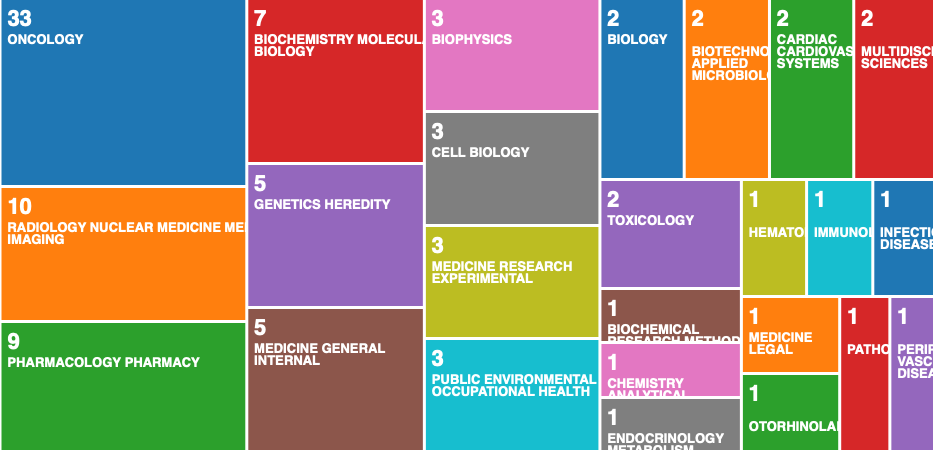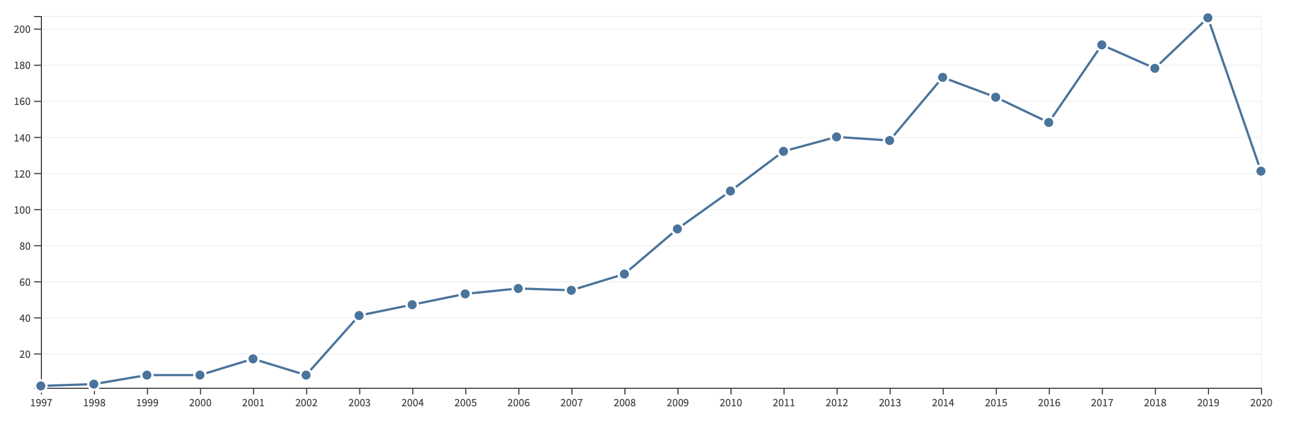Introduction
Research into the safety of drugs traditionally used in clinical practice has been unfairly neglected by the scientific community. In this sense, the justifying logic is based on the assumption that medications that have been tested over time and have been prescribed by several generations of physicians have hardly any statistically significant side effects. Moreover, the public is unlikely to be excited that the use of such traditional drugs may cause an increased risk of cancer.
Meanwhile, developed critical thinking, which is an attribute of a professional medical researcher, indicates the necessity to conduct highly reliable clinical trials in order to study the nature of the effect of reference drugs. The unprecedented British cohort study found a link between the use of angiotensin-converting enzyme (ACE) inhibitors and the lung cancer development in arterial hypertension patients (Hicks et al., 2018).
It should be clarified that arterial hypertension is considered a group risk factor of dangerous pathological processes and urgent conditions: from classic hemorrhagic or ischemic stroke to heart attack, acute renal failure, or chronic form with rapid progression. Taking into account the in-depth study of this condition, the medical community has been using substances of the inhibitor category for more than a century, suppressing the activity of the corresponding enzyme.
Coupled with angiotensin II receptor blockers, Sartans, ACE inhibitors have gained wide popularity as standard drugs for the heart failure treatment and prophylaxis, as well as for lowering blood pressure (Momoniat et al., 2019). Among the most active substances working on this principle, Captopril, Ramipril, and Fosinopril should be emphasized. Although the patient will have to have the medical prescription to buy these substances, generics actually have a low cost, which is an additional factor in their popularity (“Captopril,” 2020; “Fosinopril,” n.d.; “Ramipril,” 2019).
Moreover, according to Marcovecchio et al. (2017), ACE inhibitors are actively administered to adolescents diagnosed with diabetes: this is difficult to argue since, indeed, the short-term effects of the drugs have been proven repeatedly. The above provisions clearly illustrate the high popularity of drugs among both the medical professional community and citizens.
The clinical description of ACE inhibitors comes down that they are incredibly powerful, but at the same time, mild in the context of the undesirable sides of drugs for the treatment of arterial hypertension, which block the biochemical mechanism of vascular contraction. This makes them considered one of the most effective means available. The inhibitors block the action of angiotensin-converting enzyme used by the body to transform the oligopeptide hormone angiotensin I into angiotensin II (Herman et al., 2020).
The second type of molecule promotes vascular spasm, which increases the total peripheral resistance, as well as aldosterone production in the adrenal glands, which causes sodium and fluid retention. The drugs inactivate both forms of the hormone, which leads to a blood pressure reduction and a decrease in the intensity of the breakdown of bradykinin, which is needed to expand blood vessels and reduce pressure.
Nevertheless, it is worth saying that studies have shown that a long-term example of inhibitors is associated with increased cancer development: patients with five years of experience taking medicines are 22% more likely to get lung cancer than those who take blockers only (Hicks et al., 2018). An increase in medicine use experience to 10 years resulted in a 31% chance of developing lower respiratory tract tissue damage. Taking into account the seriousness of this situation, an in-depth literature review should be conducted to determine the reliability of the results.
The PICO(T) Question
For patients diagnosed with arterial hypertension, does the long-term use of angiotensin-converting enzyme inhibitors, as compared to angiotensin receptor blockers II, have an impact on the increased risk of lung cancer for the experience of drug use more than five years?
Table 1. Table of components of the PICOT question.
Strategy to Find Relevant Scientific Literature
It seems evident that a severe topic claimed to be the problem of this work requires careful and thorough literature selection. Among others, the increased demand for reliable sources is justified by the pretentious nature of the statement, since researchers, physicians, and patients have hardly associated lung cancer development and the administration of inhibitors. Therefore, a full search and analysis of scientific articles were carried out for the research in this paper, considering four inclusion and two exclusion criteria.
To assess the relevance of these studies, the author analyzed citations and categories of topics in the electronic database Web of Science. In particular, the search was performed on two key phrases: “ACE inhibitors” and “lung cancer.” Thus, according to Fig. 1, most of the works containing both terms belong to cancer research. At the same time, Fig. 2 illustrates that in recent decades, there has been an active growth in the number of works on this subject.


The discussion of the platform used for the search is of primary importance. Understanding the urgency and modernity of the research, the author chose the strategy of searching works in electronic digital databases, namely Google Scholar, PubMed by NCBI, and Elsevier. The breadth of the platforms is due to the need for more objective analysis, and since each of the libraries has a strict algorithm for issuing materials, the expansion of the spectrum allows to get more relevant literature.
A total of 43 works were received related to the identified problem: 24 from Google Scholar; 10 from PubMed; and nine from Elsevier. It is worth admitting that not all of them discussed the relationship between lung cancer and ACE inhibitor intake but could illustrate the principle, meaning, and description of medications, phenomena, or diseases.
Indeed, not all of the 43 works will be used in future projects, as many of them are secondary studies or have severe limitations. Thus, the following inclusion criteria were used to assess the quality and relevance of the articles:
- the article should be written in English;
- the year of publication should not be earlier than 2016;
- the work should not focus on the unconfirmed opinion of the author;
- it is desirable that the experimental area is located in the USA.
In order to avoid using undesirable sources, the following exclusion criteria were applied:
- works written in a language other than English are not used;
- articles that have significant limitations are not used.
Finally, special attention should be paid to discussing the keyword search strategy. The following phrases were used as such:
- ACE inhibitors;
- ACE;
- angiotensin receptor blockers;
- lung cancer;
- arterial hypertension;
- captopril;
Along with the syntactic combinations that produce material with a strict set of each term (“phrase 1” AND “phrase 2”):
- ACE inhibitors AND lung cancer;
- ACE inhibitors AND angiotensin receptor blockers;
- arterial hypertension AND lung cancer.
References
Captopril. (2020). GoodRx. Web.
Fosinopril. (n.d.). GoodRx. Web.
Herman, L. L., Padala, S. A., Annamaraju, P., & Bashir, K. (2020). Angiotensin converting enzyme inhibitors (ACEI) . Web.
Hicks, B. M., Filion, K. B., Yin, H., Sakr, L., Udell, J. A., & Azoulay, L. (2018). Angiotensin converting enzyme inhibitors and risk of lung cancer: Population based cohort study. British Medical Journal, 363(k4209), 1-8. Web.
Marcovecchio, M. L., Chiesa, S. T., Bond, S., Daneman, D., Dawson, S., Donaghue, K. C.,… & Dalton, R. N. (2017). ACE inhibitors and statins in adolescents with type 1 diabetes. New England Journal of Medicine, 377(18), 1733-1745. Web.
Momoniat, T., Ilyas, D., & Bhandari, S. (2019). ACE inhibitors and ARBs: Managing potassium and renal function. Cleveland Clinic Journal of Medicine, 86(9), 601-607. Web.
Ramipril. (2019). GoodRx. Web.
Clarivate analysis. (n.d.). Web of Science. Web.